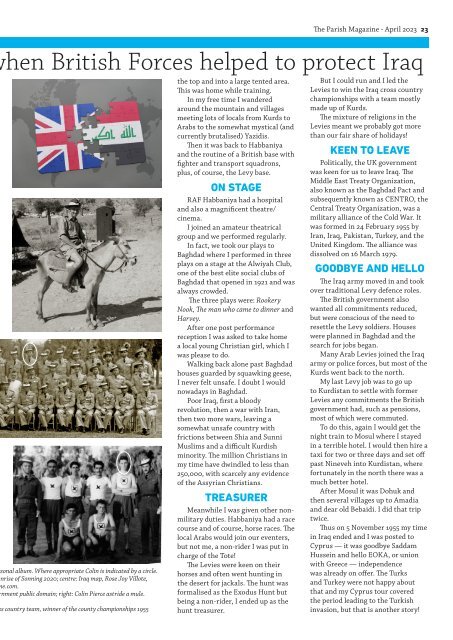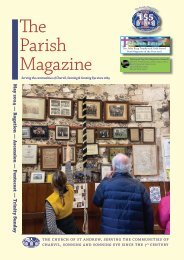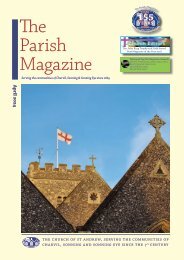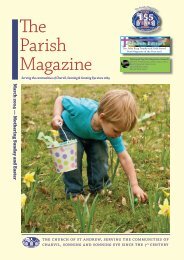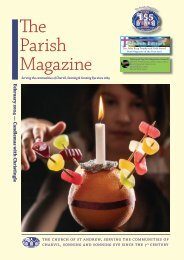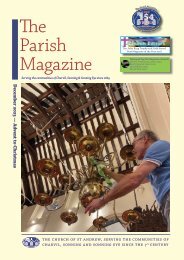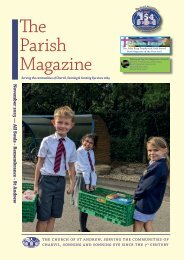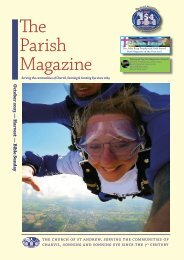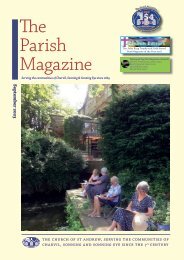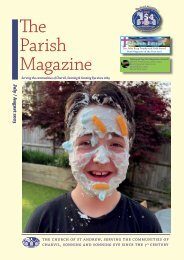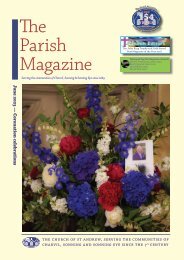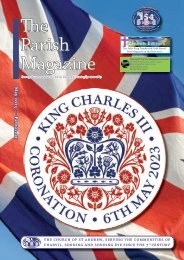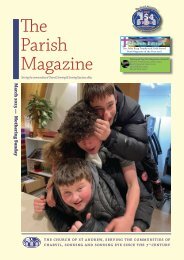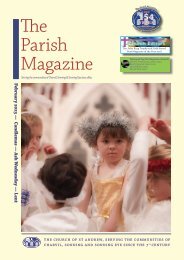The Parish Magazine April 2023
Serving the communities of Charvil, Sonning and Sonning Eye since 1869
Serving the communities of Charvil, Sonning and Sonning Eye since 1869
You also want an ePaper? Increase the reach of your titles
YUMPU automatically turns print PDFs into web optimized ePapers that Google loves.
the top and into a large tented area.<br />
This was home while training.<br />
In my free time I wandered<br />
around the mountain and villages<br />
meeting lots of locals from Kurds to<br />
Arabs to the somewhat mystical (and<br />
currently brutalised) Yazidis.<br />
<strong>The</strong>n it was back to Habbaniya<br />
and the routine of a British base with<br />
fighter and transport squadrons,<br />
plus, of course, the Levy base.<br />
RAF Habbaniya had a hospital<br />
and also a magnificent theatre/<br />
cinema.<br />
I joined an amateur theatrical<br />
group and we performed regularly.<br />
In fact, we took our plays to<br />
Baghdad where I performed in three<br />
plays on a stage at the Alwiyah Club,<br />
one of the best elite social clubs of<br />
Baghdad that opened in 1921 and was<br />
always crowded.<br />
<strong>The</strong> three plays were: Rookery<br />
Nook, <strong>The</strong> man who came to dinner and<br />
Harvey.<br />
After one post performance<br />
reception I was asked to take home<br />
a local young Christian girl, which I<br />
was please to do.<br />
Walking back alone past Baghdad<br />
houses guarded by squawking geese,<br />
I never felt unsafe. I doubt I would<br />
nowadays in Baghdad.<br />
Poor Iraq, first a bloody<br />
revolution, then a war with Iran,<br />
then two more wars, leaving a<br />
somewhat unsafe country with<br />
frictions between Shia and Sunni<br />
Muslims and a difficult Kurdish<br />
minority. <strong>The</strong> million Christians in<br />
my time have dwindled to less than<br />
250,000, with scarcely any evidence<br />
of the Assyrian Christians.<br />
Meanwhile I was given other nonmilitary<br />
duties. Habbaniya had a race<br />
course and of course, horse races. <strong>The</strong><br />
local Arabs would join our eventers,<br />
but not me, a non-rider I was put in<br />
charge of the Tote!<br />
<strong>The</strong> Levies were keen on their<br />
horses and often went hunting in<br />
the desert for jackals. <strong>The</strong> hunt was<br />
formalised as the Exodus Hunt but<br />
being a non-rider, I ended up as the<br />
hunt treasurer.<br />
<strong>The</strong> <strong>Parish</strong> <strong>Magazine</strong> - <strong>April</strong> <strong>2023</strong> 23<br />
hen British Forces helped to protect Iraq<br />
sonal album. Where appropriate Colin is indicated by a circle.<br />
nrise of Sonning 2020; centre: Iraq map, Rose Joy Villote,<br />
e.com.<br />
nment public domain; right: Colin Pierce astride a mule.<br />
s country team, winner of the county championships 1955<br />
ON STAGE<br />
TREASURER<br />
But I could run and I led the<br />
Levies to win the Iraq cross country<br />
championships with a team mostly<br />
made up of Kurds.<br />
<strong>The</strong> mixture of religions in the<br />
Levies meant we probably got more<br />
than our fair share of holidays!<br />
KEEN TO LEAVE<br />
Politically, the UK government<br />
was keen for us to leave Iraq. <strong>The</strong><br />
Middle East Treaty Organization,<br />
also known as the Baghdad Pact and<br />
subsequently known as CENTRO, the<br />
Central Treaty Organization, was a<br />
military alliance of the Cold War. It<br />
was formed in 24 February 1955 by<br />
Iran, Iraq, Pakistan, Turkey, and the<br />
United Kingdom. <strong>The</strong> alliance was<br />
dissolved on 16 March 1979.<br />
GOODBYE AND HELLO<br />
<strong>The</strong> Iraq army moved in and took<br />
over traditional Levy defence roles.<br />
<strong>The</strong> British government also<br />
wanted all commitments reduced,<br />
but were conscious of the need to<br />
resettle the Levy soldiers. Houses<br />
were planned in Baghdad and the<br />
search for jobs began.<br />
Many Arab Levies joined the Iraq<br />
army or police forces, but most of the<br />
Kurds went back to the north.<br />
My last Levy job was to go up<br />
to Kurdistan to settle with former<br />
Levies any commitments the British<br />
government had, such as pensions,<br />
most of which were commuted.<br />
To do this, again I would get the<br />
night train to Mosul where I stayed<br />
in a terrible hotel. I would then hire a<br />
taxi for two or three days and set off<br />
past Nineveh into Kurdistan, where<br />
fortunately in the north there was a<br />
much better hotel.<br />
After Mosul it was Dohuk and<br />
then several villages up to Amadia<br />
and dear old Bebaidi. I did that trip<br />
twice.<br />
Thus on 5 November 1955 my time<br />
in Iraq ended and I was posted to<br />
Cyprus — it was goodbye Saddam<br />
Hussein and hello EOKA, or union<br />
with Greece — independence<br />
was already on offer. <strong>The</strong> Turks<br />
and Turkey were not happy about<br />
that and my Cyprus tour covered<br />
the period leading to the Turkish<br />
invasion, but that is another story!


